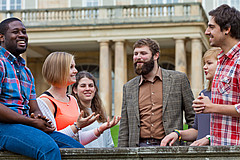Number 1 in Baden-Württemberg for the 4th time:
University of Hohenheim strongest in pushing forward internationalization [16.07.18]
€ 384 per student in 2017 / a total of over € 3.6 million for internationalization projects and scholarships / No. 1 in Baden-Württemberg, among top ten in Germany
Study and research networks, international center, active exchange by lecturers and students: According to the German Academic Exchange Service (DAAD), when it comes to international orientation, the University of Hohenheim is the most active university in the state. That was shown in its current funding list. The DAAD shows which universities qualified for the largest amounts of funding per student with their activities. Last year the University of Hohenheim in Stuttgart was also ranked first in this area in Baden-Württemberg. With its € 384 in funding per student, the University of Hohenheim came in sixth place nationally.
With the current edition of the DAAD funding balances, the University of Hohenheim not only successfully defended its top placement. Its actual expenditures per student even increased from € 302 to € 384. The total amount of funding thus rose by around 20 percent from almost € 3 million to over € 3.6 million.
“The consistently high level of funding for programs and projects confirms that we are still on the right track,” declared the Vice President for International Affairs at the University of Hohenheim, Prof. Dr. Andreas Pyka.
“The DAAD funds go directly into the University of Hohenheim’s internationalization strategy. They enable us to build up and maintain long-term partnerships as well as support lecturers and students with an international focus,” stated the Director of the Office of International Affairs, Franziska Schenk.
Internationalization projects with the highest amounts of funding
Food Security Center (FSC):
The University of Hohenheim’s FSC makes an innovative and effective scientific contribution to combatting hunger and improving global food security. Around 100 scientists from the areas of agricultural, natural, business, economic, and social sciences research at the FSC with a special focus on the tropics. In 2017, the research training group “Climate Change Effects on Food Security (CLIFOOD)” started at the FSC together with Hawassa University in Ethiopia. The group is meant to contribute to reaching the UN’s sustainable development goals (SDG). In 2017, the German Academic Exchange Service funded the two projects with a total of € 1.45 million.
Exchange program Erasmus+
In the past year alone, around 250 students, instructors, and staff members went abroad in Europe with Erasmus+ support and to partner countries outside of Europe. In 2017, the DAAD provided just over € 694,000 for this.
Strategic Network for Bioeconomy (BECY) and Thematic Network “Innovation, Entrepreneurship and Finance” (INEF)
BECY researches new paths to new products, new production processes, and a modern, sustainable economy with bio-based resources (bioeconomy) together with five international partners. Also with five international partners, INEF looks into topics such as corporate financing, innovative start-ups, and the implementation and financing of innovations. The DAAD support for both networks in 2017 was € 261,500.
Special projects for refugees
Other projects stand out not with their financial strength but with their social components: In 2016, the University of Hohenheim started a special intensive German course for refugees.
The course is tailored to the special needs of young refugees and designed to prepare them for studying at Hohenheim and other universities.
The DAAD supported the program in 2017 with € 59,000 from its “Integra” program.
The language course is complemented with the project “Welcome - Student initiatives for refugees”, which encompasses several activities being done on campus. The DAAD supported the project in 2017 with € 9,000.
DAAD Prize
Not only student projects but also individual students’ work is honored by the DAAD. This year, the DAAD prize for outstanding achievements of foreign students at the University of Hohenheim went to Raisa Ramdeen from Trinidad and Tobago, enrolled in the Master's program Crop Sciences.
With the DAAD prize, the DAAD aims to give the large number of international students at German universities a face and connect them to stories. This makes clear that each individual international student takes a piece of Germany with them back home and leaves something in Germany - an enriching experience for both sides. The DAAD prize comes with € 1,000 per university and has been presented for more than ten years.
Background: DAAD funding ranking
The German Academic Exchange Service (DAAD) is the world’s largest funding organization for academic exchange. It is supported by German universities and students. Since 2000, the DAAD has provided funding balances for its member universities. The balance contains information on individual funding as well as program and project funding.
The DAAD lists the 100 universities with the highest amount of funding (in proportion to the total number of all students at the university). In Baden-Württemberg, the University of Hohenheim with its € 384 in funding per student reached first place, followed by the University of Konstanz with € 268 per student. Nationally, the Magdeburg-Stendal University of Applied Sciences (1st place) and the FH Schmalkalden University of Applied Sciences (2nd place) lead the list. In this year’s national ranking, the University of Hohenheim was in 6th place.
Text: Dannehl / Klebs
Contact for press:
Franziska Schenk, University of Hohenheim, Office of International Affairs
T +49 711 459 22020, E franziska.schenk@verwaltung.uni-hohenheim.de


